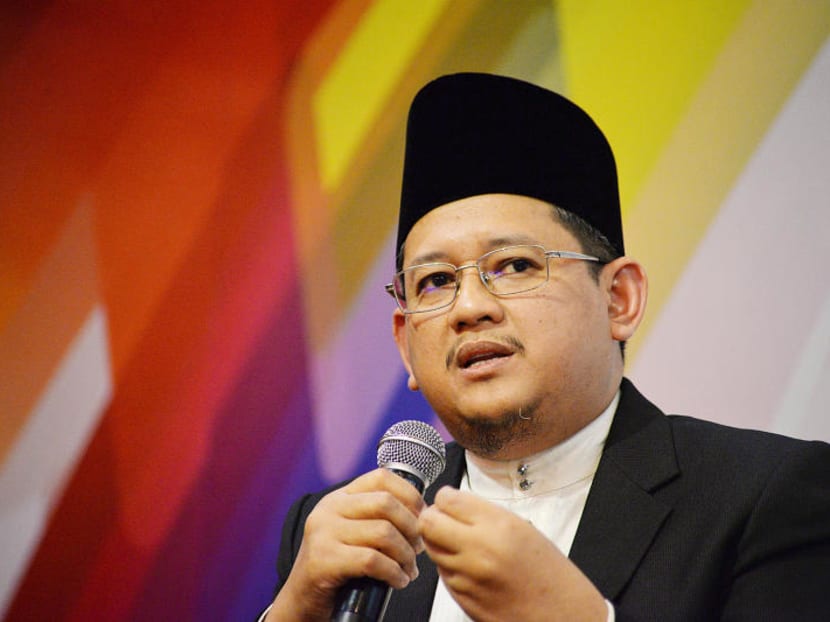Working with authorities can save loved ones: Mufti tells Muslims
SINGAPORE — Saying he was deeply troubled by news of the first-ever detention of a Singaporean woman for radicalism, Dr Fatris Bakaram, the Mufti of Singapore, on Monday (June 12) urged the Muslim community to take the matter of self-radicalisation “very seriously”. They should also not shun help from the authorities and experts who can “save our loved ones”, he said.

Dr Mohamed Fatris Bakaram, the Mufti of Singapore, seen here in a file photo, has urged the Muslim community to turn to authorities and experts for help when dealing with self-radicalisation. TODAY file photo.
SINGAPORE — Saying he was deeply troubled by news of the first-ever detention of a Singaporean woman for radicalism, Dr Fatris Bakaram, the Mufti of Singapore, on Monday (June 12) urged the Muslim community to take the matter of self-radicalisation “very seriously”. They should also not shun help from the authorities and experts who can “save our loved ones”, he said.
In a statement issued to the media, Dr Fatris said: “We should not hesitate to seek the help of those in our community who are better equipped to deal with certain challenges.”
He added: “Difficult as it may be … we must not hesitate to work with the authorities and with the Religious Rehabilitation Group, because it is only by doing so that we can save our loved ones. One life lost to exclusivism and extremism is one life too many.”
The Mufti’s comments came after the Ministry of Home Affairs said Syaikhah Izzah Zahrah Al Ansari had been detained for radicalism under the Internal Security Act (ISA).
She had tried to join the Islamic State (IS) in Syria, with her daughter in tow, and become a “martyr’s widow”. Her family did not report her activities to the authorities, and destroyed “important evidence” of her plans to join the militant group.
Separately, Senior Minister of State (Defence and Foreign Affairs) Mohamad Maliki Osman and the Islamic Religious Council of Singapore (Muis) echoed the Mufti’s comments, and urged the Muslim community to seek the authorities’ help in such cases.
Dr Maliki also called on Singaporeans to stay united, and not allow Islamophobia to grow from this incident. “We must also continue to work hard at expanding the common spaces among different ethnic and religious groups to build mutual understanding and respect,” he said.
He reiterated that the Muslim community “categorically rejects the views of the detainee, which has no place in either Singapore, or in Islam. The community here is largely peaceful, and play our part in making Singapore a strong, multiracial, and multi-religious nation”.
Muis, Singapore’s highest Islamic authority, said that Izzah’s detention reinforces the fact that “we may not personally possess the capability to help those who are on the path to radicalisation, no matter how well-meaning our intentions”.
It said: “The best way to help our friends and loved ones is to seek the help of experts. This is for the good of the individual, and the community.”
The council said that, along with its partners, it will not let up in efforts to inoculate the Muslim community against exclusivism and extremism, particularly on social media.
“An individual may fall prey to false narratives and teachings on the Internet and social media, such that even a real life support structure may not be able to counter them,” Muis said. “The community needs to be very wary of the carefully crafted messages which IS and similar movements are projecting on social media.”
Even as community leaders stressed the need to do more to counter extremist ideology, they underlined the need for families to reach out to qualified outsiders for help.
Mr Naseer Ghani, 59, vice-chairman of the West Coast Inter-Racial and Religious Confidence Circle, said: “Just as a sick person requires medical help, the best thing is to refer them to a medical institution that specialises in dealing with the matter, rather than try to use in-house methods, house remedies, or traditional methods to try to cure them.”
He stressed that the safety and well-being of the country are paramount, even though it is “very natural” for people to be reluctant to report their family members to the authorities.
Madam Harinah, 52, who is the assistant vice-principal of Madrasah Aljunied and a member of the Asatizah Recognition Board, said that families were unaware of the procedures and consequences. “Maybe we can educate the family by saying, for example, when the first report is made, what will happen, and what the next steps that will be taken are,” she suggested.
The Singapore Federation of Chinese Clan Associations said it was “shocked” to hear news of the latest detention. Nevertheless, its president Chua Thian Poh stressed: “We must not be affected by the actions of radicalised minority that undermine Singapore’s racial and social harmony.”
Singapore Buddhist Federation president Seck Kwang Phing reiterated that radicalisation is “all the individual’s problem (and has) nothing to do with religion”.
“We have done a lot of projects with our Muslim friends, and we know they have worked hard to maintain religious harmony ... we should not be upset or affected by this isolated case, and we give them our full support in maintaining religious harmony.” ADDITIONAL REPORTING BY JOEY CHUA XUE TING






